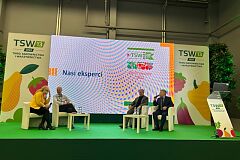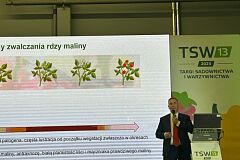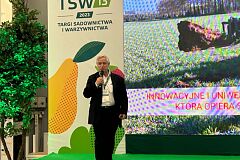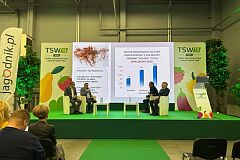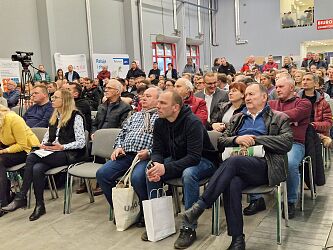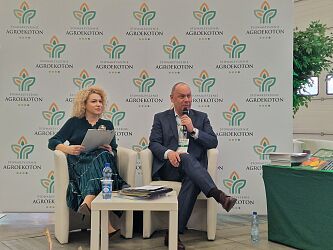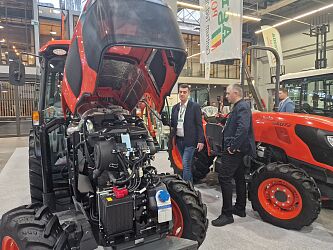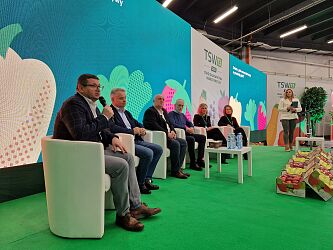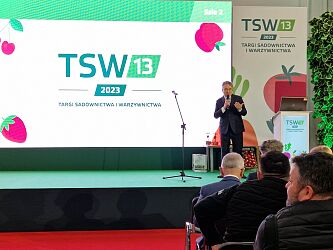News

How to avoid getting into dire straits when you a raspberry grower? About it during the conference during the TSW in Targi Kielce
What should a raspberry plantation owner pay special attention to?
The first lecture of the Blueberry Conference - a part of the TSW Targi Kielce was devoted to raspberry cultivation in tunnels set in the ground and in pots. Paweł Krawiec PhD. from Horti Team and Krzysztof Sak from Agronom Berries delivered their speeches at the conference and discussed which soil substrate to choose, soil restructuring, soil structure treatments and insecticidal fungi. Plants behave differently in open air when compared with tunnels. Potted seedlings offer advantages: equal sort of material, young root system, high level of growth after planting, and health and well-balanced plantations.
Substrate the most important is - a substrate based on coconut fibre is the most popular and suitable for growing raspberries. This substrate is neutral, sterile, free from pathogens and diseases, has a neutral pH, optimal water-air ratio and one that easy to rehydrate after drying. According to Krzysztof Sak from Agronom Berries, it is essential that there are no free fractions in the raspberry substrate, otherwise, the root will die.
The container choice for raspberries is also important. These can be plastic containers with high resistance to UV rays and plastic bags that work well in transport. The pot colour the plant is in is also very important; dark ones heat up faster, brick red ones reflect the sun's rays, thanks to which the plant roots do not die.
When growing raspberries, pay attention to the height of the seedling, the number of buds and how well-developed root system is. It is enough to have 80 buds in plants per 1 m2, 19,200 kg of fruit yield from a plantation is feasible.
What to choose, raspberries in the ground or in a pot?
It's hard to answer this question, because raspberry growers unanimously state that raspberry cultivation is a high-risk business.
Raspberries in the ground require great care for the root system, humidity is more difficult to control, it is also more difficult to choose the type of seedling. However overwintering is less problematic, there is limited possibility to control the harvest date yet the investment costs are lower. No artificial substrate is needed, irrigation is easier, and the plantation lasts longer.
Raspberries in a pot grower with no problems when it comes to root system diseases, it is necessary to protect the plants for the winter, they also require more precise fertilization and better humidity control.
Experience of raspberry growers
The first of the producer panels at the TSW featured Dr Paweł Krawiec from Horti Team, Damian Czarnota from the Orchard Farm in Godów, Sławomir Brzusek from the Orchard Farm in Moniaki and Piotr Figura from the Orchard Farm in Karmanowice; they discussed their experiences in raspberry cultivation, pointed out the most popular varieties of fruit and will provide tips on fertilization and protection of raspberries. In the second expert panel featured Dr. Paweł Krawiec from Horti Team, Robert Bełdowski from Fieldstone, Dr. Agnieszka Orzeł from Niwa Plantation- Dr Berry and Krzysztof Sak from Agronom Plants, who discussed the legal protection of varieties, raised the issue of illegal propagation and importance of varieties and quality requirements. Black raspberry, which has anti-inflammatory and antibacterial, as well as anti-cancer properties, was indicated as the healthiest, not very popular variety of berries.
How to grow berries successfully?
The speakers list of the 1st Blueberry Conference included Francis Bucaille, from France, who pointed out biological methods of soil revitalization, explained how to obtain ideal, healthy soil and what the mycorrhization process actually is. The speaker pointed out that the most important is the perfect mineral balance, and the ratio of calcium and magnesium to improve the structure of the soil. He also listed the key soil indicators, phosphorus, boron, zinc, magnesium, sulfur, sodium and potassium contents.
Michał Wojcieszek from Yara Poland emphasized how to care for the needs of raspberries and pointed out what affects the yield. The most important aspects include water, reaction, soil abundance and structure, weeds, diseases and pests.
Krzysztof Krupa from Syngenta spoke at TSW and referred to the question: How to properly protect raspberries? In his lecture, he listed the most common diseases affecting raspberries and the factors that cause these diseases. Gray and white mold, dieback of shoots, raspberry rust, powdery mildew and anthracnose are the biggest problem for raspberries growers. Krzysztof Krupa also pointed out solutions and chemicals that help us fight crop diseases.
The Fruit and Vegetable Farming Expo is held at Targi Kielce on 18 and 19 January 2023.
(MS)



